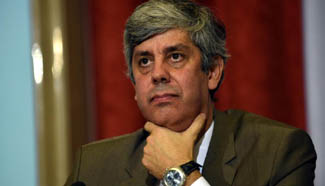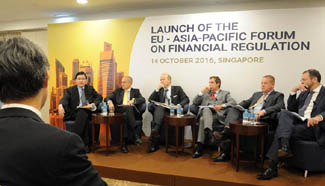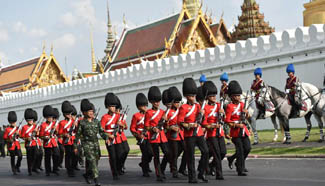by Xinhua Writer Liu Chang
BEIJING, Oct. 15 (Xinhua) -- At a time when a strong and sustainable global recovery remains elusive, the BRICS nations should come even closer together and help lead the world economy out of the woods, just as they had done in the aftermath of the 2008 global financial crisis.
Later this week, leaders of the five BRICS nations - China, Russia, India, Brazil and South Africa - will gather in the western Indian state of Goa for an annual summit. They are expected to discuss deepening cooperation within the bloc and solutions to reverse sluggish global economic growth.
Over the past eight years since the onslaught of the worst financial tsunami in the postwar era, the group of the world's major emerging economies have made an indisputable contribution to global growth and ensured the world survived the deep recession.
Today, because of a harsh global economic and trade environment, notably declining commodity prices and withering global demand, the BRICS countries are navigating rough waters.
Already, talk in the West about the death of BRICS is ramping up, with claims that the carnival enjoyed by developing nations is coming to an end.
In fact, the BRICS countries remain a major boost for global economic growth, and a forceful advocate for reforms in global governance as well as inclusive development worldwide.
Among the group, China and India continue to enjoy fairly high growth rates, and have ample potential to maintain such momentum in the foreseeable future. Brazil and Russia, two nations that are fighting hard battles to keep recessions at bay, have begun to show signs of recovery. The economy of South Africa, the second largest in Africa, rebounded in the second quarter, thus allaying fears of a contraction.
Trade protectionism and anti-globalization sentiments are spreading rapidly across the world, and have depressed the outlook of the global economy. The International Monetary Fund (IMF) has cut its forecast for this year's global economic growth to 3.1 percent, the slowest since the 2008 financial crisis.
For the BRICS nations, the best thing they could do at present is to help the global economy find a path toward faster and more vibrant growth. That means boosting unity within the group and nurturing an even closer trade and economic partnership. A China-proposed free trade area among the top five developing nations could be a good start in that direction.
The BRICS club should also continue to shoulder the responsibilities of reforming critical international financial institutions like the IMF and the World Bank, where developing nations remain severely under-represented.
From its onset, the BRICS countries have been trying to level the playing field in the world, where the developed economies and the developing world can share the benefits of a sound and growing global economy. The bloc, unlike what some skeptics claim in the West, isn't willing to vault itself at the expense of others.
And in Goa a few days later, the opportunity for emerging economies to exercise the spirit of responsible stewardship of a recovering global economy should be seized.











